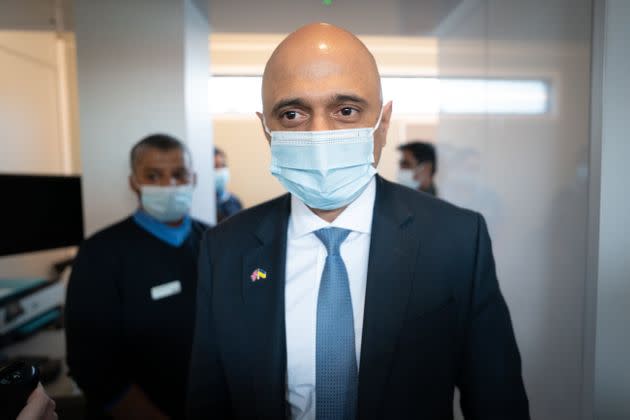Hospitals Forced To Bar Relatives Amid Soaring Covid Rates

Health secretary Sajid Javid on a recent hospital visit. (Photo: Stefan Rousseau via PA Wire/PA Images)
Scores of hospitals are having to shut their doors to visitors due to soaring Covid infections.
NHS trusts are having to stop family members visiting patients due to increasing Covid rates and are only allowing visits for exceptional circumstances such as end of life care.
It comes after health bosses issued a stark warning that they expected Easter Covid pressures to be as “bad as any winter”.
The NHS is currently caring for 20,000 Covid-19 patients coupled with high rates of staff absences and huge demands on emergency care.
While some trusts kept visiting restrictions in place following the height of the pandemic, others have had to return to measures.
Last month, East Suffolk and North Essex NHS Foundation Trust temporarily closed the majority of its ward visiting slots.
They said it was due to the “increasing number of patients” with Covid in their hospitals, a rapid rise in community infections and the virus impacting staff levels.
The trust, which manages hospitals inColchester, Clacton, Ipswich and Felixstowe, is allowing exceptions for end of life care and parents of children.
In their maternity departments they have temporarily reduced the number of birthing partners from two to one.
James Paget University Hospitals NHS Foundation Trust is permitting visits only in exceptional circumstances, such as for patients at the end of life and for vulnerable patients such as those with a learning disability.
United Lincolnshire Hospitals NHS Trust has also had to tighten patient visiting rules at Lincoln, Boston and Grantham hospitals.
General visiting is restricted, but remains for maternity, paediatrics, neonates and end of life care.
They said they took the “difficult” decision to protect patients and staff from the continued increase in Covid.
Director of nursing, Dr Karen Dunderdale, said: “We know that this decision will be upsetting for those who have loved ones in hospital, but we must prioritise the safety of our patients and staff at this time, and do not take these decisions lightly.
“Please be kind and understanding with our teams who are going above and beyond to care for their patients.”
However, signs of normality have started to return in some regions where they have experienced a drop in Covid figures.
Last month Somerset NHS Foundation Trust had to temporarily restrict visiting to “exceptional circumstances only” due to “extremely high” infection rates.
But the trust said they had seen a reduction in the last week and reopened visiting yesterday via appointment.
Similarly, Yeovil District Hospital NHS Foundation Trust has just opened up its “responsible visiting” through which families or friends can book a visiting appointment directly with the ward.
Some of the trusts concede that it is a “challenging time” and are urging visitors to get vaccinated, wear masks and follow social distancing guidelines.
They also plead with the public to be patient with any additional measures.
It follows a damning intervention by the NHS Confederation, that speaks for healthcare organisations.
They have called for a return to mask wearing and accused Downing Street of “abandoning interest” in the pandemic.
The group said that in the last week alone 20 emergency departments in England have been forced to turn patients away as they issued “diverts” due to being too full.
Rory Deighton from the NHS Confederation told HuffPost UK:“Where restrictions to visits have had to be introduced, they will be temporary, within certain services only, and with very particular circumstances in mind.
“Covid-19 is in high circulation in the community and more than 20,000 patients are currently in hospital with the disease and so, alongside very high staff absences and bed occupancy levels, this poses huge operational challenges for the NHS.”
This article originally appeared on HuffPost UK and has been updated.

 Yahoo News
Yahoo News 